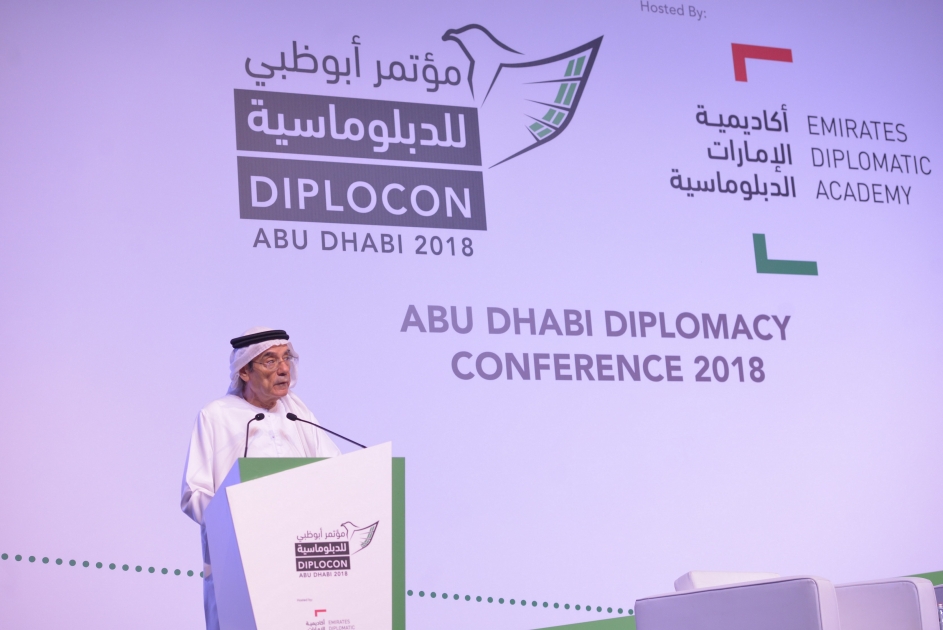
Cultural Diplomacy, Technology and Gender Balance Dominate Discussions at Inaugural Abu Dhabi Diplomacy Conference
Under the patronage of His Highness Sheikh Abdullah bin Zayed Al Nahyan, UAE Minister of Foreign Affairs and International Cooperation, the inaugural two-day Abu Dhabi Diplomacy Conference successfully concluded today.
Hosted by the Emirates Diplomatic Academy (EDA), the Conference convened more than 300 thought leaders, international relations specialists, academia and members of the private sector to discuss diplomacy in the era of the Fourth Industrial Revolution. Themes covered included how the field of diplomatic practice in the 21st century will address issues of gender, training, technology and culture.
Headlining a talk on ‘The Power of Cultural Diplomacy’, His Excellency Zaki Anwar Nusseibeh, UAE Minister of State and Member of EDA’s Board of Trustees, emphasised the important role that culture plays in nurturing a greater understanding of diversity.
He said: “In the UAE, we have a vast creative talent pool at our disposal, ranging from artists and filmmakers to musicians and writers, Emirati and non-Emirati alike. As we take on a more prominent role in the region and globally, we believe showcasing our creative talent will promote greater understanding among people who come from diverse backgrounds and hold different values through the medium of culture. It will also highlight our progressive nature among nations and provide a model to which other countries can aspire.”
He added: “EDA continues to make pivotal contributions to the UAE's thought leadership. The Abu Dhabi Diplomacy Conference offers us the opportunity to update ourselves on the latest methods in our field and discover best practices from around the world. This event has helped the discussion shaping the future of diplomacy and reinforced the UAE’s status as a thought leader in the region and beyond.”
Her Excellency Susana Malcorra, former Minister of Foreign Affairs of the Argentine Republic, spoke about the ‘The Future of Multilateral Diplomacy’ and stressed the practice of open dialogue and knowledge sharing in diplomacy.
She said: “The success of the event lies in the fact that diplomats always seek common ground to find solutions. Platforms such as the Abu Dhabi Diplomacy Conference, where we can all participate and share our experiences in the field of diplomatic practice – both successful and not so successful, and particularly with those who will become our future diplomats – provide us the ways and the means to develop new blueprints for enhancing the effectiveness of diplomacy.”
In addition to keynote speaker sessions, the agenda included interactive panel discussions and workshops designed to identify effective solutions that can be implemented by ministries of foreign affairs across the globe.
His Excellency Nabil Fahmy, Founding Dean of the School of Global Affairs and Public Policy at the American University in Cairo and former Minister of Foreign Affairs of the Arab Republic of Egypt, said: “Whether we are talking about peacemaking, multilateral diplomacy, the new actors in the field or new technologies that are impacting it, it is clear that the art of diplomatic engagement is changing at a rate that is unprecedented in its history. Ignoring such changes would be to condemn the position of diplomat to the annals of time much in the same way other professions that were once prominent have been consigned. And at this point in our world’s history, diplomats are perhaps needed now more than ever, because regardless of how the job may change or the requirements may be altered, there is one thing a diplomat must always be ready and willing to do – listen. We must listen, especially when other people do not. We must understand, especially as others do not care. And then we must act, especially for those who are unable.”
Another panel, focused on the ‘Future of Public Diplomacy and Cultural Relations’, examined how the field has moved from the closed and secretive world of the past to one that is becoming progressively more transparent. Panellists included His Excellency Ludovic Pouille, French Ambassador to the UAE, and His Excellency Maher Nasser, Director of the Outreach Division at the UN Department of Public Information.
His Excellency Ludovic Pouille said: “I thank His Highness Sheikh Abdullah bin Zayed Al Nahyan and the organisers of the Abu Dhabi Diplomacy Conference for this great opportunity to exchange views on the growing importance of soft power. Just a few days after Louvre Abu Dhabi’s first anniversary and the visit of the French Ministry of Culture, I was glad to share my thoughts on cultural diplomacy, while highlighting the many remarkable examples of the unique cultural partnership between France and the United Arab Emirates.”
For his part, His Excellency Maher Nasser said: “New technologies have significantly changed the media landscape with faster and wider ability to communicate globally. With this added reach, new challenges have also emerged. Communicators have a massive challenge to break through this clutter and effectively reach their intended audience. And they must.”
The Abu Dhabi Diplomacy Conference is an annual event that seeks to explore the shifting dynamics of 21st century diplomacy and promote the exchange of knowledge, theory and best practices on a range of themes related to international relations.


























